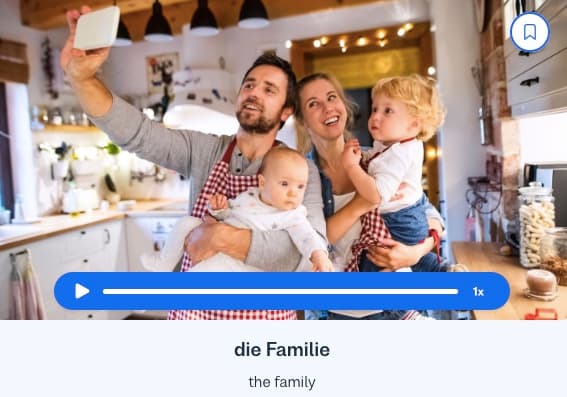I want to learn...
Author:

Mathias Neubauer
Large families can be overwhelming – think of all the birthday parties you need to organize and all the Christmas gifts you must buy. However, talking about family in German is not!
Mastering the vocabulary about family members is one of the first things that we learn in our native language as well as in a foreign language which is why it serves as an excellent topic to start a conversation in German. It helps you to get to know people’s background a bit better but also to talk about your own.
In this guide, you will learn more than the basic words like father or mother in German. Get ready for a journey through German family life, and let’s check out what it takes to succeed in day-to-day conversations about family in German.
Close family members
Our relationships and interactions with immediate family members (nahe Familienmitglieder) significantly influence our personalities. They impact our perception of love and closeness, shape our approach to conflict resolutions, and determine the way we form connections overall. Thus, the experience we make with our parents and siblings are very important.
Here is the vocabulary you should memorize to talk about immediate family in German:
German family vocabulary
| German | English |
|---|---|
| Eltern | parents |
| die Mutter | the mother |
| die Mama / Mami | the mom / mommy |
| der Vater | the father |
| der Papa / Papi | the dad / daddy |
| Geschwister | siblings (there is no word for only one sibling in German) |
| die Schwester | the sister |
| der Bruder | the brother |
| die Tochter | the daughter |
| der Sohn | the son |
| die Ehefrau | the wife |
| der Ehemann | the husband |
Extended family members
Extended family members (erweiterte Familienmitglieder) are relatives extending beyond the immediate family whose members we just saw above. This broader network can include grandparents, aunts, uncles, and even more distant relatives.
The understanding of extended family may vary between cultures and societies. Even so, appreciating our extended family members can foster a sense of belonging and support.
Let’s have a look at these words in German for extended family members:
German extended family vocabulary
| German | English |
|---|---|
| Großeltern | grandparents |
| die Großmutter | the grandmother |
| die Oma | the grandma |
| der Großvater | the grandfather |
| der Opa | the grandpa |
| Urgroßeltern | great-grandparents |
| die Urgroßmutter / Uroma | the great-grandmother / great-grandma |
| der Urgroßvater / Uropa | the great-grandfather / great-grandpa |
| die Enkel | the grandchildren |
| die Enkelin | the granddaughter |
| der Enkel | the grandson |
| die Tante | the aunt |
| der Onkel | the uncle |
| die Nichte | the niece |
| der Neffe | the nephew |
| die Cousine | the cousin (female) |
| der Cousin | the cousin (male) |
Family members by marriage
This type of family members, commonly known as “in-laws”, includes people linked to a person through marital bonds rather than biological relationships. Upon marriage, individuals not only become part of their spouse’s immediate family but also establish connections with a wider range of relatives through their spouse.
The following words include typical family members by marriage:
German family members vocabulary
| German | English |
|---|---|
| Schwiegereltern | parents-in-law |
| die Schwiegermutter | the mother-in-law |
| der Schwiegervater | the father-in-law |
| die Schwiegertochter | the daughter-in-law |
| der Schwiegersohn | the son-in-law |
| Stiefeltern | stepparents |
| die Stiefmutter | the stepmother |
| der Stiefvater | the stepfather |
| die Stieftochter | the stepdaughter |
| der Stiefsohn | the stepson |
| die Stiefschwester | the stepsister |
| der Stiefbruder | the stepbrother |
As you can see, a few key words say something about the relationship in the family:
Groß-:relation to two generations before
Example: Großeltern (grandparents), Großmutter (grandmother)
Ur-:comes before groß- and indicates a generation after grandparents
Example: Urgroßmutter (great-grandmother)
Schwieger-:Relatives of the spouse
Example: Schwiegervater (father-in-law), Schwiegersohn (son-in-law)
Stief-:Relatives one has through a second/third/etc. marriage
Example: Stiefmutter (stepmother), Stiefschwester (stepsister).
Further German family vocabulary
So far, we have covered typical vocabulary about family in German, such as mother, father, siblings, but also aunt and uncle in German. Understanding the basics of that topic is essential for talking about families.
However, family-related vocabulary includes so much more that you can use for meaningful communication within the realm of familial connections.
Let’s take a look at some more varied vocabulary associated with family to enhance our capacity for daily-life conversations.
Family vocabulary in German
| German | English |
|---|---|
| die Verwandten | the relatives |
| das Kind / die Kinder | the child / the children |
| mütterlicherseits (e.g.: meine Großeltern mütterlicherseits) | mother’s side/maternal (e.g.: my maternal grandparents) |
| väterlicherseits (e.g.: meine Oma väterlicherseits) | father’s side/paternal (e.g.: my paternal grandparents) |
| Zwillinge | twins |
| die Zwillingsschwester | the twin sister |
| der Zwillingsbruder | the twin brother |
| Drillinge | triplets |
| die Halbschwester | the half-sister |
| der Halbbruder | the half-brother |
| adoptiert | adopted |
| ein Paar | a couple |
| verliebt | in love |
| verlobt | engaged |
| verheiratet | married |
| getrennt | separated |
| geschieden | divorced |
| sich scheiden lassen | to divorce |
| gestorben | dies/dead |
| der Partner | the partner (male) |
| die Partnerin | the partner (female) |
| die Generation | the generation |
How to talk about family in German
Now it’s time to dive into the more practical stuff – you know, chatting about the people who mean the most to us. Now that we have learned a lot of family-related words, we want to use them in conversations. (By the way, in this article we cover more topics on German conversation)
Here are some examples you will definitely hear when you talk about family with native speakers. Just pick them up and you’ll be able to describe your family a bit more in detail,(e.g. that you have a little sister in German).
Hast Du eine große Familie? (Do you have a big family?)
Nein, ich habe eine kleine Familie: meine Eltern und ich. (No, I have a small family: my parents and me.)
Wie heißen Deine Eltern? (What are your parents‘ names?)
Meine Mutter heißt Sarah und mein Vater heißt Paul. (My mother's name is Sarah and my father's name is Paul.)
Meine Eltern sind verheiratet / getrennt / geschieden. (My parents are married / separated / divorced.)
Hast du Geschwister? (Do you have siblings?)
Ja, ich habe zwei Geschwister (Yes, I have two siblings.)
In case you only have one sibling:
Ja, ich habe eine Schwester / einen Bruder. (Yes, I have one sister / brother.)
Sind deine Geschwister jünger oder älter? (Are your siblings younger or older?)
Meine Schwester ist älter und mein Bruder ist jünger. (My sister is older and my brother is younger.)
Alternatively: Ich habe eine große Schwester und einen kleinen Bruder. (I have a big sister and a little brother.)
Hast du noch alle Großeltern? (Do you still have all your grandparents?)
Ich habe noch meine Großeltern väterlicherseits. Meine Großeltern mütterlicherseits sind schon gestorben. (I still have my paternal grandparents. My maternal grandparents have already died.)
Family-related phrases and idioms in German
Just like English, German has some specific phrases and expressions that are related to family, including some colorful sayings that make talking about family more fun. In this last chapter, we’ll look at some phrases you can drop during a conversation, and you’ll appear like a native.
German family-related phrases
| Phrase | English translation | Meaning or usage |
|---|---|---|
| Du gehörst zur Familie. | You belong to the family. | e.g. if you want to call friend family. |
| Du bist Teil der Familie. | You are part of the family. | e.g. if you want to call friend family. |
| Wir sind wie eine Familie. | We are like a family. | e.g. your team at work |
| Das liegt in der Familie. | That lies in the family. | It runs in the family. (Characteristics and behavior that are very similar between family members.) |
| Der Apfel fällt nicht weit vom Stamm. | The apple doesn't fall far from the tree. | When a child is very similar to its parents. (optics-wise or behavior-wise) |
| Bei der Familie ist es am schönsten | Family is the nicest place to be. | You feel the most comfortable at your parents’ home. |
| Freunde sind die Familie, die man sich auswählt. | Friends are the family you choose. | to call friends family |
| Das ist nicht von schlechten Eltern. | That is not from bad parents. | something has good quality |
Let’s review
So, that's a wrap on our journey through the German family life – from the basic words for our immediate family like mom and dad in German over vocabulary for extended family members like aunt or uncle in German to more advanced terms and expressions.
We’ve covered everything you need to succeed in conversations about family. Now, you are able to describe your family and talk about your mom in German. Or maybe you want to tell someone that you are very similar to your brother or son in German, then just use one of the phrases we presented at the end.
Cheers to the words that bring us together and the stories of family life!
AUTHOR

Mathias Neubauer
Newlanguages


